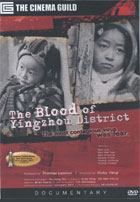
The Blood of Yingzhou District 2006
Distributed by Cinema Guild, 115 West 30th Street, Suite 800, New York, NY 10001; 212-685-6242
Produced by Thomas Lennon
Directed by Ruby Yang
DVD, color, 40 min.
Jr. High - Adult
Anthropology, Asian Studies, Child Development, Disability Studies, Social Work
Date Entered: 01/29/2009
Reviewed by Maureen Donovan, The Ohio State UniversityThis Academy Award winning documentary film introduces the stark realities of life for AIDS orphans in Yingzhou District of Anhui Province (China). Weaving stories gathered over the course of a year and shot on site by local film crews, the film gradually builds our understanding of the complex situations the orphans face. The district is part of an area where the practice of re-injecting donated blood back into the veins of donors after removal of plasma, so as to promote quicker recovery, was followed to encourage donors to come regularly. This practice led to the spread of AIDS, especially in Henan Province, but also in Hubei and Anhui.
Of all the children introduced, we follow Gao Jun of Wang Dian Village closest. Stricken with AIDS himself, Gao Jun lives with his mentally unhinged grandmother, but plays alone accompanied only by the family's pig, dog, and chickens and shunned by everyone else, including his cousins who live next door. After his grandmother dies, Gao Jun is placed with the Dings, foster parents who are both HIV-positive themselves, and their two lively children. For a time life improves for Gao Jun, but the relentless progress of his disease continues, leaving us with a bleak sense of his future, despite his relatively strong support network.
Other dimensions of life as an AIDS orphan in rural China are revealed through the story of Ren Nan'nan, an HIV-positive girl in Guo Zhuang Village who receives medications personally donated to her by an American woman. Her two sisters find their lives complicated by the social stigma of having this illness in their family. On her wedding day, one sister (Little Flower) is depressed, troubled about the impact that not telling her husband of Nan'nan's disease might have on her marriage, although she herself is not infected.
Awareness of Nan'nan's problems prompted one woman to start a charity devoted to improving the lives of AIDS orphans in the area. The charity's activities, along with the educational work of local health officials, are having a positive effect. With support, some orphans find encouragement in their struggles. For example, the three Huang siblings of Miao Zhuang Village are not discouraged at discrimination from classmates, but instead vow to double their efforts at studying, so they can surpass everyone who taunts them at school. The film reminds us, though, that thousands of other AIDS orphans in China, remain alone and helpless in the face of cruel discrimination, ignorance, and neglect.
Awards
- Academy Award (Best Documentary Short Subject), 2007
- River Run International Film Festival, Jury Prize, Best Documentary, 2007
- Silverdocs Documentary Festival, Grand Jury Award, 2006
- Thessaloniki Documentary Film Festival, Audience Award, 2007
- VC Film Festival, Los Angeles Asian Pacific Film Festival, Golden Reel Award, 2007